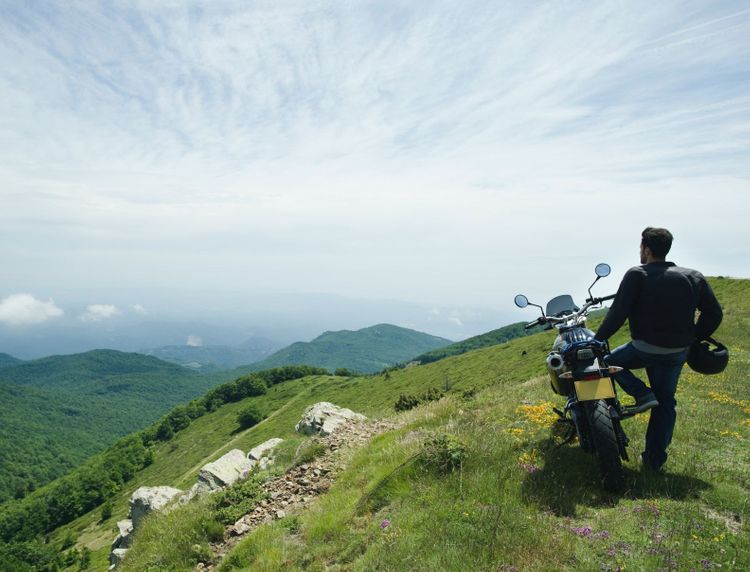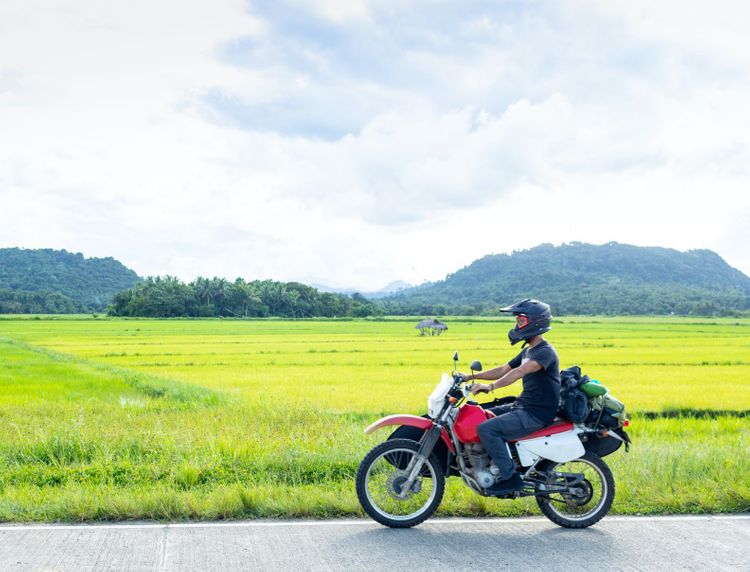Bike Riding Tips for Monsoon Season
Riding a bike in India during the monsoon season can be difficult. Countless potholes, water-logged roads, and open manholes are the leading causes of road mishaps and the primary cause of bike damage on rainy days. However, a monsoon ride can be a joy if you take a few precautions and keep an eye on your bike's various components.
Share this article
Protect Your Two Wheeler From All Kinds Of Risks
Comprehensive, Third Party And Own Damage Bike Insurance At Tempting Premium
List of Content
- Top 10 Bike Riding Tips to Follow This Monsoon
- To Conclude
- Disclaimer
Top 10 Bike Riding Tips to Follow This Monsoon
Check your bike's tyre health
Before you hit the road during the monsoon, inspect your bike's tyres. Examine the amount of wear and tear it has sustained over time. Since tyres are the only components in direct contact with rough roads, the chances of threads coming out of them are extremely high. When roads become clogged during the monsoon, threads help to maintain grip while dispersing water. If you believe there is not enough depth in the thread, replace your tyres immediately.
Now, moving on to air inflation, riding a bike with over-inflated or under-inflated tyres during the monsoon season increases the likelihood of an accident. Go through the user manual to understand the optimal tyre pressure and refill it at the garage accordingly.
Maintaining a tyre’s health protects you from slippage and other negative repercussions. To extend their longevity, you may also purchase a tyre protection rider at the time of bike insurance renewal.
Maintain your speed limit
During the monsoon, rash riding is strongly discouraged. It is recommended you keep track of your speed limit and avoid exceeding it. On muddy or damp roads, the best bike riding tips suggest riding at a speed of 30 to 40 km/h. It will safeguard you from events such as skidding.
Let's take an example to support this concept.
Assume you are driving on the highway at a speed of 90-100 km/h. The pedestrian suddenly jumps in front of your bike, forcing you to apply a hard brake. In this situation, the likelihood of skidding is high, which could result in injury to you and the pedestrian.
When the monsoon season arrives, you must acquire a personal accident cover while purchasing bike insurance online. The reason is it will cover the cost of treating an injury if the above scenario occurs.
Keep proper distance
When riding a bike in the rain, keep a safe distance from the front or heavy vehicles. It's because the bike loses traction on wet roads. As a result, stopping will take longer than usual, regardless of how hard you apply the brake. Such occurrences are the common cause of road collisions.
Apart from that, you must avoid passing heavy vehicles. There are two reasons for this. The first is that there is a good chance that the potholes they miss will hit you, resulting in an accident. The second reason is that if you are attempting to overtake a truck near a road intersection and the truck suddenly turns, it is nearly impossible to save yourself from the accident.
Avoid water splash
One of the best monsoon bike riding tips is to leave your childish act of water splashing at home. If you have a habit of performing this act, your wheels are likely to become stuck in open manholes, causing damage to your bike and bodily harm to you. Furthermore, riding on water-logged roads causes severe engine damage since the water intrusion can cause your engine to perform abnormally.
Avoid riding your bike through areas with poor drainage during the rainy season. You should also consider purchasing an engine protection add-on. It will cover the cost of repairing or replacing your bike's engine if water intrusion damages it.
Invest in monsoon gear
Riding during the monsoon season is difficult. You will struggle to keep your grip on the handlebars, clutch, brakes, and footpads. The difficult riding will expose you to a variety of road mishaps. As such, investing in high-quality monsoon gear is recommended to deal with such situations. Your monsoon riding kit should include a waterproof shoe cover, anti-fog helmets, helmet glass wipers, backpack cover, elbow and knee pads, and waterproof hand gloves.
In case you already have a good quality helmet, but the visor has many scratches, you should consider replacing the visor or the entire helmet. Riding with a damaged helmet causes your vision to blur, increasing the likelihood of a collision.
Keep the lights on
Many bikers avoid turning on their lights during the day, regardless of how bad the weather is. But you may be unaware that poor visibility is one of the leading causes of road accidents. Assume you are riding your bike during a heavy rainstorm with dark clouds. Do you believe a heavy vehicle, such as a truck, coming from the front will be able to see you if your lights are off? No way. However, with the lights on, you are easily visible to other vehicles, and you can also keep an eye on pedestrians, four-wheelers, and potholes.
Thus, you should check the brightness of your headlamps and taillights. Clean them with dry clothes to prevent dirt or mud from obstructing the illumination.
Clean moisture
Moisture is harmful to the health of your bike. It harms components such as the fuel filter, air filter, and oil filter. If the filters are damaged by moisture or become clogged with dirt, your bike's engine will shut down in the middle of the journey, leaving you stranded in the rain.
The best way to avoid this situation is to replace filters at the intervals recommended in the user manual. Soak the surface and surrounding areas of various electrical components. It will help to keep moisture from damaging mechanical parts.
Battery condition
One of the most important components of your bike is the battery. It is in charge of ensuring the proper operation of various spare parts. Only a healthy battery will allow your bike's headlights, taillights, indicators, horn, and self-start to function properly. Check that the wires from the various spare parts are properly connected to the battery and that the fluid levels are within the proper range; if not, refill the electrolyte with de-ionised water.
Regular servicing
Never miss a servicing due date, even if it means paying a large sum of money. Take your bike to an authorised service centre right before the monsoon season begins. Request that the mechanic performs an inspection of your bike's technical and electrical components. If any parts need to be replaced, have them done correctly. Ask them to replace the engine oils and lubricate the chains.
Integrating servicing to the above motorcycle riding tips in monsoon will save you from various uneven road incidents.
Purchase insurance
You might have third-party insurance for a bike to save yourself from legal consequences after an accident. But, such insurance will not help you tackle your own damage costs that you might incur from an accident caused during a monsoon ride. You must consider either buying a standalone own damage cover alongside third-party insurance or a comprehensive policy.
If you are buying insurance for your bike from Tata AIG, we suggest you compare two-wheeler insurance policies on our website to make an informed decision. We would also like to add that buying an insurance policy from Tata AIG is very convenient. We do not only offer bike insurance, but we also have all types of car insurance policies.
To Conclude
Riding a bike in the rain is difficult and, therefore, necessitates special preparation. You must ensure that your bike's electrical components are in good working order, that the brakes and clutch are not jammed, and that the air filters are not clogged. You will also need to spend money on monsoon riding equipment. Though it is not possible to inspect the entire bike yourself, it is recommended that you take your bike to the nearest garage for servicing.
Disclaimer
All the bike prices and other information listed above pertain to a specific city and vehicle model. Since this information is subject to change, it is advisable to check the latest information before purchasing a vehicle or an insurance policy.
Protect Your Two Wheeler From All Kinds Of Risks
Comprehensive, Third Party And Own Damage Bike Insurance At Tempting Premium
Share this article
Latest from our blogs

5 Tips To Keep Your Two Wheeler Looking New
Make sure to wash it often. This keeps dirt and other unwant...
Read More
What Does It Take to Be a Good Biker?
You must have wondered what it takes to become a better ride...
Read More
5 Things You Did Not Know About Two Wheeler Insurance
In a time of heavy traffic and accidents, two wheeler insura...
Read More